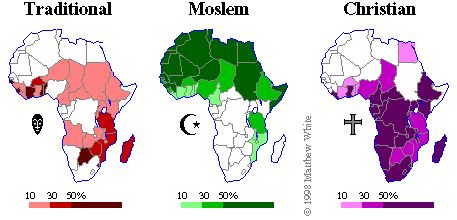The Chinese may well start to take a more active role in Africa.
I suppose they have not yet trained any of their army to act in peacekeeping roles yet.
http://www.voanews.com/english/news/a-13-2009-05-30-voa17-68687462.html
As the United Nations finds its peacekeeping missions stretched around the world, one major power is making a difference. China, a country that once criticized UN peacekeeping operations as interference with national sovereignty, is now a major troop contributor. Close to 2,200 Chinese are now wearing the characteristic blue helmets of U.N. peacekeepers.
Chinese peacekeepers are an increasing and welcome presence to over-stretched UN peacekeeping operations from Sudan to Haiti and Liberia.
With 115,000 blue helmets dispersed around the world on increasingly complex missions, the U.N. says it is grateful for the Chinese contribution. Alain Le Roy is the United Nations Undersecretary-General for Peacekeeping Operations.
"Their troops are very well disciplined of course, the organization of their command structure is extraordinary and whether you are on the ground in Haiti or Darfur, the Chinese camp can be easily recognized and the competence of the troops, their engineers, their doctors are at a very high quality," he said.
China does not provide combat troops, but it does provide medical teams, engineers, civilian police, and military observers. Chinese diplomats at the UN say they want to project a reassuring peaceful image, one of a responsible country.
And China's Ambassador to the U.N., Zhang Yesui, says as the country develops they will become more involved.
"China is still a developing country and a low income developing country but I am confident that as China develops we will be in a better situation to contribute more to United Nations Peace keeping operations," he explained.
The current commitment of 2,200 peacekeepers is not a large one for a country that has a standing army of more than 2 million, but it is valuable in terms of the image it projects in the international community, especially in Africa, where the deployment of its blue helmets coincides with a wave of Chinese investment.
"Whenever there is peace, I think there will be opportunities for investment," he added. "So I think this is very important for the business people as well."
Presently, China ranks far behind peacekeeping giants such as Pakistan, India, Bangladesh or Nigeria, but its contribution has surpassed that of most western countries. China also has recently deployed several naval vessels to help combat piracy off the coast of Somalia.
Peacekeeping analyst Richard Gowan from the Center on International Cooperation sees China as filling a gap that many Western powers cannot handle.
"Western countries do not have the money and they do not have the troops to sustain significant peacekeeping outside Afghanistan and the Balkans, and China is taking advantage of that. It's filling the gap. And China is starting to look like a global power, while European countries especially are in retreat."
The U.N. hopes the Chinese surge will motivate other countries to follow suit. The United States and Britain have all down-scaled U.N. peacekeeping, focusing more on providing money rather than troops. Former UN Peacekeeping Operations Head Jean Marie Guehenno says that gives the impression to some that they do not care about U.N. operations.
And he argues Chinese involvement may encourage other large powers to get back into peacekeeping. "I think it is not at all unthinkable that at some point there would be greater re-engagement of the Western members of the Security Council in peacekeeping and I think the engagement of China is an additional factor that may push in that direction and that is a good thing," he noted.
Around the world, blue helmets are the ambassadors of a new China.

